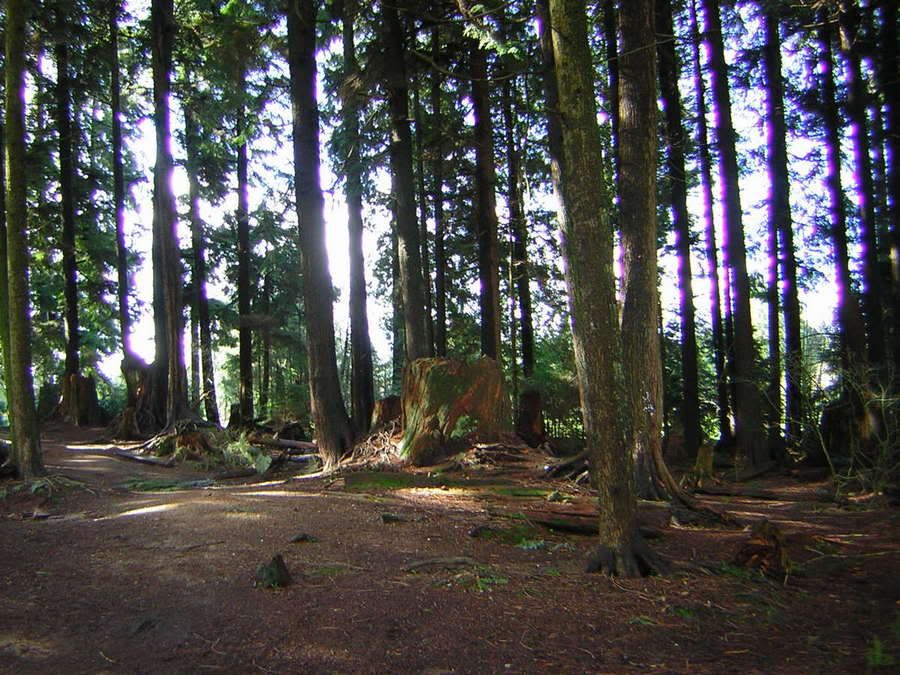YHWH: A Terrible Beauty
I've always found it fascinating that G-d is sometimes referred to as HaMakom, The Place. When I first learned this, I fired off an email to the Aish rabbi, asking for clarification. I thought the concept of G-d as The Place was so brilliant, so unlike any other way of referring to G-d. And it made so much sense! By that time it was clear to me that the G-d of my childhood, was not "out there". Perhaps he had even been real. But I had never experienced him as real.
And then one day, G-d came through. And stayed. To me G-d is very real. There are no doubts. So, it made sense that something like "The Place" carried a sense of that concreteness, gave gravity to the presence. Words like "The Place" provide the ground for apprehension, and probably came from, an apprehension of G-d as the space for everything to rest, inhabit and live. Like an embrace.
In more prosaic terms, HaMakom means that "everything is contained within G-d (conceptually), while He is not contained in anything. As our Sages say: "He [G-d] doesn't have a place, rather He is The Place of the Universe"." What particularly struck me about this name for G-d was its neutrality. G-d provides the matrix for being and that state is described purely, without embellishment, without emotion. All assumption of character drops away; it seems value neutral.
A similar neutrality could be said to inform another of G-d's names, HaShem, The Name, a reference to G-d from the Rabbinical period, circumlocuting the Divine Name, the Name Revealed by G-d. The increasingly popular HaShem carries the least amount of information, and if it is at all possible, is less emotion laden than HaMakom. The use of HaShem is like pointing the finger in the direction of the Divine Name as it passes strangely before us in the distance. One cannot apprehend a Name. Both HaMakom and HaShem , I think, suggest a bit of a Zen Buddhist/Taoist sensibility.Look, it cannot be seen - it is beyond form.
Listen, it cannot be heard - it is beyond sound.
Grasp, it cannot be held - it is intangible.
These three are indefinable, they are one.
From above it is not bright;
From below it is not dark:
Unbroken thread beyond description.
It returns to nothingness.
Form of the formless,
Image of the imageless,
It is called indefinable and beyond imagination.
Stand before it - there is no beginning.
Follow it and there is no end.
Stay with the Tao, Move with the present.
Knowing the ancient beginning is the essence of Tao.
~ Lao Tzu
But the name that gives G-d a pre-eminently Jewish sensibility is the G-d of Jewish history- YHWH. G-d is The Place, G-d is The Name, and most importantly for us, G-d is a verb. Whereas the former two describe an experience of G-d, the latter is a revelation of G-d. G-d reveals his name on Horeb, at the Burning Bush, to Moses: "ehyeh-asher-ehyeh" (Ex. iii. 14), in translation, a form of the verb, "to be", officially interpreted as "I am that I am". G-d is alive. And G-d makes himself known to us, deliberately.
The G-d of the Bible swashbuckles and plots his way through history, engaged, full of character and emotion, learning as he goes along, engrossed in his creations, in relationship to them. Always in relation to them, even creating a covenant with them. G-d is alive!
And yet, G-d, for all his charming ways, seems very cognizant of the fact that we cannot get too close to him and live. We also learn in the Bible that if indeed, one does accept the covenant, for all of those rosy promises, there's one hell of a price to pay. There is a price to pay for getting closer to him, for enlightenment. Moses saw the "face" of G-d and lived, but Nadab and Abihu, the sons of Aaron, got zapped when they tried to cozy up to him by offering him "strange fire".(Lev 10:1-2) Some hapless shmo got too close to the Ark when David was moving it and G-d stopped the poor guy dead in his tracks. I wonder if Moses lived and the others did not, because G-d chose Moses, but did not favour the others.
G-d also chose the Israelites, and did not allow them to venture any farther than the foot of Horeb, and shrouded himself in clouds, spit out fire and thunder so that they should not die by getting too close to him.( Deut 4:31-36 ). Still, they quaked in their sandals, so overwhelmed and terrified, that they asked Moses to act as intermediary and relay the rest of the commandments to them.(Deut 5: 22) I imagine by that time that they were all prostrate seized up jellyfish on the ground.
Then there is the famous cautionary tale of the four sages who entered Pardes (the orchard). One gazed upon the divine and went mad. One became an apostate. One died. And only Rabbi Akiva left in peace, for he had entered in peace. Another perilous G-djourney ends in tragedy.
Isaac lay bound upon some cold, rough stone altar, supposedly a willing sacrifice to G-d. A sacrifice also offered by his father, who was willing to slash the throat of his beloved son and heir and watch the life force gush out of him in crimson red streams and watch his traumatised body flop like a fish in reaction as he died. It was G-d's will.(Gen 22: 1-19). I imagine that father and son were beside themselves with fright and anguish and grief. A midrash (exposition) tells us that the angels in heaven wept at the sight of Isaac tied down and trembling, wide-eyed with fear, and their tears washed his eyes, and blinded him, yet he could see beyond human sight. After the Akedah, Abraham and Isaac leave separately and there is no further record of them ever speaking to each other again.
It seems that all journeys involving YHWH are perilous. And it seems that if G-d does the choosing, and you accept, you have a fighting chance of getting through the peril. Maybe. This much I do know, as I have written once before, "I feel bound to a life that is not my own; it belongs to G-d....I honestly don't feel it is within my purview, that which happens to me. I am carried along, transported by a life that somehow, for the time being, in some way needs me even if I don't know how. It may not even be a life of my choosing...." Even after writing this, I had no clear idea of what it meant to be compelled by G-d. How terrifying that feeling was, not remotely like "love". There is an element beyond awe that creeps in once in a while when I look at how perilous my journey has been and continues to be, a journey I feel I have not chosen. I would have chosen a Mediterranean cruise, instead, thank you very much.
A few weeks before conversion I was having vivid dreams, some of them felt like out of body experiences. Incredibly rich and colourful dreams. There was the gorgeous tabernacle in the desert, a tent of rich, textured, multi-coloured fabric straight out of the Bible; it seems my dreams know how to sew to specification. There was the queen of violet roses, and her twin sister in her white frock holding a golden sheaf of grain. Several times, I rose up to the heavens and finally knew everything, I knew the answers, only to come back into my body and upon awakening, instantly forget. And then there was the power of YHWH, as I and other pilgrims were compelled to our knees in the desert in terrifying, overwhelming, awe before G-d's holy mountain. I was shocked by how bone-meltingly scary it was, like feeling the force of a full scale nuclear blast.
Now there is always an element of fright, because I don't know what G-d will do next or will ask of me. The comforts of home and hearth seem light years away. G-d may be love but that is not all G-d is. G-d is compelling in his presence, and in his desire. Meanwhile, I've learned that nothing in life could ever be as terrifying as being without G-d. Fear of G-d, yirah, is just as real as G-d is real. So is fear of losing G-d.
I used to wonder if I was crazy.
And then I happened to crack open a commentary* on Psalm 42; the psalm begins,As a stag yearns for streams of cool water,
so does my soul yearn for you, O G-d.
Indeed, my soul thirsts for G-d, for the living G-d....
Here is part of that commentary:
... the poet cannot stop remembering the happier days of his younger years, and, in so doing, is forced to confornt the awful, disturbing truth that the quest for a life in G-d has not brought him prosperity, fame, and unbridled happiness...but just the opposite: a life of ridicule and insult.
On top of all that, the poet's road to G-d also passes through Fear. Indeed, he suggests that he has already experienced the presence of G-d in the palpable, sensory way cultivated by the psalmists' guild, and he knows that the knowledge of G-d can be as terrifying an experience as it is a satisfying one. He remembers the feeling of being totally vulnerable, the sensation of drowning in G-d, of being lost at sea like Jonah (who also had the horrifying experience of just barely escaping death by drowning on his journey to fulfilling his own destiny in G-d , as did the Israelites on their way to Sinai).
Worse still, the poet's tortured road to spiritual fulfillment also passes through Worry in that, for all its intensity, his yearning for G-d cannot make him forget that G-d, at least most of the time, appears to be totally unconcerned with his problems. And, since the search for communion with an unseen G-d will always be an unsettling, confusing experience for practical people, the poet's uncertainty about the ultimate nature of his spiritual path is part of that worry as well.
Moderns who bring their own ambivalence about religion to their spiritual lives will find a kindred sprit in the author of the forty-second psalm, especially if they allow his words to prompt the asking of deep, challenging questions: can we moderns harness the creative energy generated by conflicting certainties about the nature of the Divine to propel us further along our spiritual paths towards communion with the elusive G-d of Israel? Or are we doomed, as so often seems the case, to be paralysed by uncertainty, almost as though respect for spiritual honesty and intellectual candor were somehow to be incompatible with living a life totally given over to yearning for redemption in G-d?
Alas, my G-d is not often a cool buddha. At least now I know that if I am crazy, I am not alone. But consider this. A psychopath who pretended to be a Jew, turned me on to Judaism. So, if I'd had a choice, sailing in the Galil would have been far more appealing. Or being shot out of a cannon. G-d does, indeed, possess a strange and terrible beauty. Remember that. And be kind to holy fools.
* Martin Samuel Cohen, Our Haven and Our Strength







 Mama
Mama
 Josh
Josh

 Han
Han
 Emet
Emet
 Sammie
Sammie
 Marly
Marly
 Tan Guy
Tan Guy
 Socks
Socks
 Big Daddy
Big Daddy
 Chaplin
Chaplin
 Coffee
Coffee
 Dove
Dove

 Bosco
Bosco
 Zena
Zena

